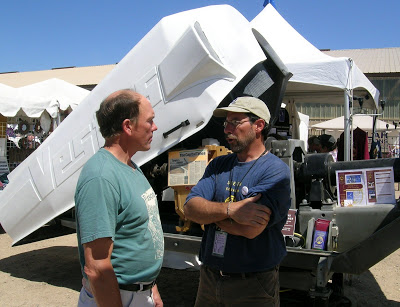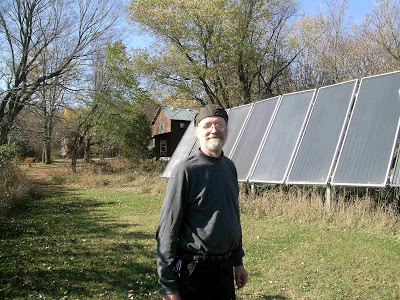by jboullion | Feb 13, 2009 | Uncategorized
From WE Energies and the Wisconsin Green Building Alliance:
Coming to Milwaukee!
Friday, March 13, 2009, 8 a.m. – 5 p.m.
ZERO ENERGY BUILDING – THE CONVERGENCE OF SOLAR POWER AND ENERGY EFFICIENCY
Lessons For Architects, Builders, Designers, Engineers, Developers, and Owners
Presenters:
Steven J. Strong, President, Solar Design Associates
Lew W. Pratsch, U.S. Department of Energy
LOCATION:
We Energies
Public Service Building – Auditorium
231 W. Michigan St.
Milwaukee, WI 53203
Sponsored by We Energies and the Wisconsin Green Building Alliance
TO REGISTER AND FOR MORE INFO, GO TO: http://www.wgba.org/zeb.html
AGENDA:
Friday, March 13, 2009
8:00am – 8:30am Registration and Continental Breakfast
8:30am – 8:45am Welcome and Introductions
8:45am – 9:15am PV Cell and Module Technology
9:15am – 10:15am Overview of PV Systems Options & Applications: Intro to basic systems and components with application examples
10:15am – 10:30am Morning Break
10:45am – 12:00pm Moving Toward Zero Energy Homes
12:00pm – 1:00pm Lunch Break
1:00pm – 2:00pm BIPV: Options, Materials and Methods
2:00pm – 2:45pm BIPV: A World View
2:45pm – 3:00pm Afternoon Break
3:00pm – 4:00pm BIPV – Detailed Case Studies
4:00pm – 4:30pm Codes, Economics and Incentives
4:30pm – 5:00pm Wrap Up with Questions and Discussion

by jboullion | Feb 10, 2009 | Uncategorized
 Rick Adamski (left) began researching wind turbine options at the Midwest Renewable Energy Fair in 2005, where he talked with turbine installer Dave Blecker of Seventh Generation, the company that installed Adamski’s turbine.
Rick Adamski (left) began researching wind turbine options at the Midwest Renewable Energy Fair in 2005, where he talked with turbine installer Dave Blecker of Seventh Generation, the company that installed Adamski’s turbine.
From a story by Monica Landeros on WLUK-TV:
There is a farmer in Northeast Wisconsin who soon won’t have electricity bills, in fact the electric company may eventually be paying him. That’s because the Maple Grove farmer near Seymour in Shawano County has installed one of the first wind turbines in his area on his own property, with the help of federal and state grants.
Look across the snow cover fields of Full Circle Farms in Maple Grove and you’ll a 110-foot tall wind turbine with three massive blades.
“The wind turbine should last 20 to 30 years,” said Full Circle Farmer Owner Rick Adamski.
It took hours to install in early February. Adamski watched every step of the process from a safe distance with some neighbors.
“We’re trying to reduce our impact on the environment,” said Adamski. . . .
Adamski’s wind turbine still needs some finishing touches and is expected to be turned on the week of February 9th.
Soon after that, Adamski won’t pay for electricity anymore. It will save him about $7,000 a year. In fact, the turbine will produce more energy than is needed. So, the extra energy will be sold back to WE Energies.
by jboullion | Feb 9, 2009 | Uncategorized
The Midwest Renewable Energy Association (MREA) offers workshops that cover a variety of topics in renewable energy (solar, wind, and more). See the course workshops page for a listing of all of the workshops and to register Click here.
by jboullion | Feb 6, 2009 | Uncategorized
From a media release issued by CREWE:
(MADISON, Wis.) – Leading Wisconsin companies are joining forces to advocate for the meaningful global warming policy changes proposed by the Governor’s Global Warming Task Force (GWTF).
The business coalition named Clean, Responsible Energy for Wisconsin’s Economy (CREWE) looks forward to working with other members of the GWTF, the Doyle Administration and other companies and organizations to push for the adoption of policies that effectively and responsibly address global warming and capture the economic development and environmental opportunities in Wisconsin, said CREWE Board Chairman Dan Ebert.
“Wisconsin is poised for a transition to a sound economy powered by good, new, green jobs,” Ebert said. “CREWE was formed around the belief that a sustained and shared partnership of government, business and citizens is needed to build a clean energy and reliable future that will benefit all Wisconsin residents and businesses.”
Coalition members include Wisconsin Energy Corp., Madison Gas & Electric, Orion Energy Systems, American Transmission Co., Johnson Controls, MillerCoors, WPPI Energy, Potawatomi Tribe and C5-6 Technologies.
CREWE is dedicated to joining forces with other supporters to promote responsible policies that address climate change, create jobs, promote energy efficiency, reliability and independence, and mitigate the economic impacts of rising energy costs, Ebert added.

by jboullion | Feb 5, 2009 | Uncategorized

Bob Ramlow stands in front of the solar hot water panels at the Artha Sustainable Living Center near Amherst.
From the newsletter of RENEW Wisconsin:
With his graying hair in a pony tail and his hand-rolled cigarettes, Bob Ramlow projects the classic appearance of an aging hippie who parted company with the rat race decades ago. And not only does he look every inch the solar energy pioneer, he is one, mentoring installation contractors and counseling prospective system owners in his capacity as Focus on Energy’s solar water heating technical consultant. Indeed, a typical day presents Ramlow with many opportunities to apply his 30+ years of experience in this area, whether it involves reading over site assessments, reviewing drawings and equipment specifications, or advising contractors whenever an installation presents an unusual challenge. . . .
Do you mind being called an aging hippie?
Not at all. I was one of many who “tuned in, turned on, and dropped out.” I wanted a fixer-upper with good soil and woods, and I bought the farmland with a nearly ruined farm house built in 1911. We farmed it for 20 years. The old house became the bed and breakfast after we built our new house in 2006.
When did your solar addiction begin?
In 1971. Dr. George Becker, a fisheries professor, supervised my independent study in my senior year in Natural Resources at the UW-Stevens Point.
One day, he told me that “we’re going for a walk” to his house. In his backyard, he had something that looked like an A-frame outhouse. It had an air collector facing the sun, and it was full of rocks to store heat. An air pump blew into his house.
I saw that, and a light went on! You could get depressed fighting nukes and DDT, like we did then, but here was something positive!
Did the Midwest Renewable Energy Association (MREA) begin about this time?
The MREA came a lot later – 1990 – after I’d spent several years of selling high-quality wood stoves, working for a company selling wall mounted air collectors, then another company that sold windows and doors with home installation as a sideline, and I formed Artha Renewable Energy as a solar consulting business in 1976.
Mick Sagrillo, now the solar electric consultant for Focus on Energy, and a lot of us in the area were doing a lot of good things by the late 1980s, when George Perez, publisher of Home Power magazine, told us we should strut our stuff – hold fairs and festivals to show off renewable energy.
We liked the idea and founded the MREA in January or February of 1990. We held the first fair at the county fair grounds in Amherst in mid-August of the same year. The first day – Saturday — it rained hard. The four holy, moldy Korean-War-era tents, where we held workshops, let the rain pour in. People were squatting on chairs to stay out of the water while they listened to the presentations. Sunday was beautiful. We had 3,000 people and made enough money to hire a part-time director for the next year’s fair.
What exactly do you do for Focus on Energy?
I mentor solar hot water installers and dealers. Installers call me a lot. They run into a situation that’s unfamiliar, or maybe they aren’t sure exactly how to squeeze all of the equipment into a tiny space, for instance. I help with nuts and bolts issues. I review solar site assessments too – probably one a day on the average.
Focus on Energy’s call center also refers homeowners, business owners, and school district staff to me when I seem to be the most appropriate person, though most people call their utility or a dealer first.
Sometimes for Focus on Energy and sometimes for the MREA, I teach classes, often to employees of heating and plumbing contractors. We’re currently working out the details for me to train installers for one of the largest contractors in the state.


